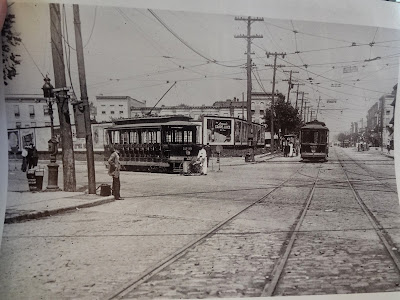I've been reading
A Tree Grows in Brooklyn, a classic 1943 book by Betty Smith about a young girl growing up poor in Brooklyn around 1912-1916.
 |
| royalbooks.com, first edition of 1943 A Tree Grows in Brooklyn |
Images that come to my mind as I read are pleasant but vague. So I've gathered a collection of 1912-1916 Brooklyn images that help to set the stage for this book:
Tenament housing in Williamsburg, Brooklyn is where Francie Nolan grew up. It probably looked something like this:
 |
| brooklynpix.com; Metropolitan Ave, Williamsburg Brooklyn 1916 |
Factories were nearby where the people worked hard to earn a meager living:
 |
| mcnycblog.org, "The Struggle to Save the Austin, Nichols, and Co. Warehouse" |
 |
| brooklynhistory.org: female factory workers 1915 ca, Eberhard Faber Pencil Factory |
Brooklyn (Trolley) Dodgers had another season in the new Ebbett's Field in 1913:
 |
| thebaseballpage.com, "Ebbett's Field 1913" |
A "trolley dodger" was a negative name that people from Manhattan had for the people of Brooklyn--because of Brooklyn's many trolleys (see wikipedia under "trolley dodger"). Here you can see a major intersection of trolleys in Brooklyn:
 |
| ebay.com photo for sale, "1916 Flatbush-Nostrand Aves Junction Trolleys Flatlands Brooklyn NYC Photo" |
Brooklyn's Vitagraph Studios was one of the first film studios:
 |
| brooklynology.brooklynpuliclibrary.org: 1913 fashion shoot at Vitagraph Studios |
Now that we've looked at Brooklyn specifically, I will be posting about early 1900s interior color schemes, flooring, wall coverings, lighting, furniture, and upholstery in another post. I want to give everyone out there with a house built around this time the context for the architects and builders at that time.











No comments:
Post a Comment